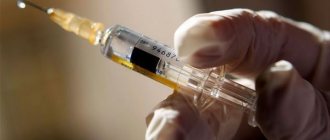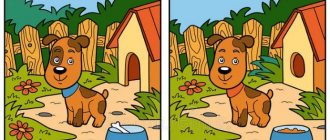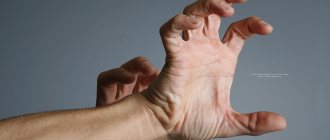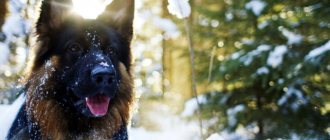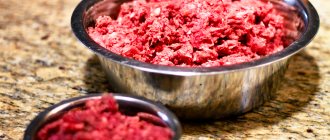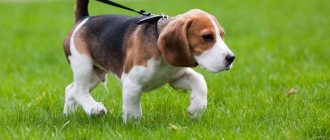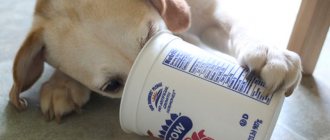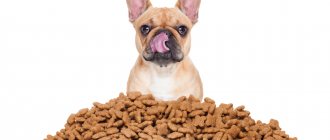The German Shepherd is one of the most famous dog breeds in the world.
We can confidently say about this breed that it is a versatile dog: it can be a devoted friend, a cheerful companion, a fearless protector, a reliable watchman, and also carry out official and investigative activities.
All this is explained by the fact that German Shepherds are very smart dogs with high mental abilities.
They are easy to train, strong and efficient.
In life, shepherd dogs are not only service dogs, but also get along well in the family, perhaps even with other animals and children.
External features of the puppy
The color of a teenage puppy is black and brown, but at this age it is still a changing puppy coat .
The ears of a six-month-old shepherd are soft and large. At about 6 months the ears rise and begin to stand up. The purebred 6-month-old puppy has a short back and a wide chest.
By this age, the dog's limbs lengthen.
A six-month-old pet grows almost to the size of an adult dog (shown in the photo) .
Height and weight parameters
| Age, months | Floor | Height, cm | Weight, kg |
| 6 | Male | 60-62 | 24-28 |
| 6 | Female | 50-52 | 18-22 |
Dogs of the German Shepherd breed are not very picky when it comes to food, but owners are obliged to carefully monitor their diet, because a well-designed daily diet is the key to health, proper physical and mental development of the puppy and its excellent well-being.
What is better – natural or dry food?
Experts in this field have differing opinions.
Feeding natural, home-prepared food has many advantages, the main one being that the owner knows for sure that the prepared food contains only healthy products for the shepherd.
But natural feeding also has a drawback - the owner needs to think over a menu suitable for his pet, depending on the health and activity of the dog, adding all the necessary ingredients.
Feeding your puppy dry food can be a good option to replace natural food . But it is necessary to take into account that only premium and super premium class food is suitable for a German Shepherd dog.
Expert opinion
Kozhevin Semyon Kirillovich
Expert dog handler.
The right natural food, formulated taking into account all the requirements for feeding a German Shepherd, is more expensive than dry food. He feeds his dog dry food in the spring and summer, and in the fall he switches it to natural food, because in the enclosure where the dog is kept, the water begins to freeze. So, specifically, his pet’s appearance is much better when fed with natural products than when dried. But the owner claims that this is strictly individual for each dog.
Basic feeding rules
Experienced dog handlers claim that there is no general diet, proposing to take into account the calorie content, the composition, the vitamin complex, and even the character of the dog, coupled with the loads it faces..
At six months of age, the formation of muscle mass in a dog is in full swing; at this moment, it is especially important when preparing a diet to take into account the correct ratio of calories, proteins, fats and carbohydrates.
IMPORTANT!
The required daily food intake of an adult dog: 3−5% of its weight, which is approximately 1 kg 200 g.
General requirements when creating a menu:
- 1/3 part - raw meat (scalded, boiled); Once a week, instead of meat, you can give fish;
- 1/3 part - porridge (millet, rice or buckwheat);
- 1/3 part - vegetables and dairy products (if dairy products cause intestinal problems in your dog, you should avoid them and replace them with vegetables).
The period of maximum active growth of a shepherd dog lasts up to a year . At this point, the puppy must be fed intensively, taking into account the calcium and vitamin intake necessary for growth and development.
Natural food
When planning your dog’s diet, you should include the following foods in the menu::
- meat and offal (necessarily liver);
- milk ;
- dairy products;
- chicken eggs (raw, boiled);
- vegetables;
- sea fish (boiled);
- cereal porridge;
- greens, berries, fruits (in limited quantities).
Regardless of the type of food (dry or natural), the puppy must eat according to a certain pattern:
- 1-2 months - a glass of food, divided into 6 doses.
- 2-3 months - 1.5 glasses in 5 approaches.
- 3-6 months - 1 liter in 4 approaches.
- 6-12 months - 1.5 liters in 3 approaches.
At one year of age, the dog begins to eat according to an adult meal schedule - twice a day.
List of foods that are prohibited for a dog's diet:
- meat with a high fat content (pork, lamb);
- bones (chicken, fish, pork);
- pasta;
- potato dishes;
- sausages;
- any baked goods;
- legumes;
- smoked, fried or dried meat;
- all types of flour food;
- candies, chocolate;
- mushrooms;
- fish (raw, river);
- pickled and canned vegetables;
- all types of canned food;
- semolina, millet and pearl barley;
- citrus fruits;
- raw milk;
- spicy dishes containing spices.
Dry food
When choosing dry food for your pet, the owner of a shepherd dog needs to pay attention to the following aspects:
- products must be branded, and not just released under license;
- high-quality food will not have a bright, saturated color (red or green);
- the composition should not contain soy and legumes (cereals are allowed);
- Puppies and pregnant women should not be given pellets with a high fat content;
- The amount of protein in the feed should be from 30 to 50%.
It would be optimal to buy food in a sealed package (from the factory).
When feeding your dog dry food, you should buy only premium and super premium brands. Economy class is not recommended for German Shepherds.
You also need to remember that food of the best quality and class can only be purchased in specialized stores and veterinary pharmacies. They are made from excellent quality products.
Popular manufacturers of the highest class food for German Shepherd dogs:
- Dukes Farm;
- Bosch;
- Eukanuba;
- Arden Grange.
Daily norm when feeding a shepherd dog with dry food:
- premium class - about 750 g,
- super premium class - 600 g.
If necessary, you can soak the granules with water or kefir (if the dog is reluctant to eat dry food) . The pet must also have round-the-clock access to drinking water.
Puppy Development Stages
It is customary to distinguish several main stages in the development of dogs.
Sucker
It starts from birth until the mother stops feeding her puppies milk. Until about day 14, babies develop their senses - they learn to walk on all fours, explore their environment, try to play with their littermates, and gain other experiences of “communication” with reality.
After the first two weeks of adaptation to extrauterine life, the socialization of puppies begins. The more they become like dogs, the more clearly their natural instincts manifest themselves. During the games, the teeth begin to be actively involved and an understanding of the strength of the bite is formed, and, consequently, the restrictions “is possible” and “is not possible.” Leadership qualities are demonstrated in the struggle for the most delicious milk nipple, located in the groin area of the lactating bitch.
Puppies
From one and a half months to six months. During this period, there is active growth of tubular bones, teeth, muscles and sternum. With proper care and proper nutrition, the animal grows at the withers and approximately doubles its body weight.
The character also changes. The emotional connection with the mother is finally broken, more independence and self-confidence appear. It is important to start training your dog on time, otherwise it may feel permissive and try to establish its own rules of the game in the house.
Young animals
From 6 to 12 months. Against the background of a noticeable decrease in growth rates and weight gain, hormonal changes in the body begin. In males, testosterone levels increase, and in females their first heat appears. The attitude towards other dogs changes, the so-called flight instinct arises.
On the one hand, the call of nature and the natural search for a partner for mating, on the other hand, the obligation to obey the owner and be obedient. This period is similar to adolescence in humans - approximately 13-15 years. Therefore, the behavior becomes not always adequate: the dog may be nervous, not respond to commands, show anxiety and give other reactions that were not previously characteristic of it.
Ripening
From one to three years. The final formation of the exterior and character. The dog ceases to be a puppy and establishes a clear position of behavior in the pack (among other dogs) and at home. It is almost impossible to challenge leadership or, conversely, try to “restructure” the animal’s temperament.
Caring for a six month old puppy
Every German Shepherd dog at about 6 months of age is trying to assert itself . At this moment, you may encounter some difficulties in obedience and periodic self-will.
The owner should try to restrain himself and not show negativity towards the dog, try to recognize and prevent negative problems that arise.
These difficulties will end with the onset of puberty of the dog. In adolescence, the formation of a German’s character ends, so the dog needs to pay increased attention especially at these moments.
At this age, you need to walk the dog 2-3 times a day for 1.5-2 hours.
A teenage dog is very active, so walks should include active games with objects, jogging, jumping, and swimming. For medical indications, for a 6-month-old puppy, the third vaccination is carried out with preliminary deworming (according to the vaccination calendar).
Dogs are also usually vaccinated against rabies during this period..
Puppy from 5 to 7 months. Part 5
Teenage aggression
A very, very important topic. It is at this age that puppies are most often given away without being able to cope with them.
At this age, the puppy can already inflict a serious bite, because... the teeth have changed. Permanent teeth are not as sharp as baby teeth. But where the baby teeth were scratched, the permanent ones can make a hole. So what to do with teenage aggression? What should you do if a puppy at this age bites you? Can this be avoided?
The first thing I want to say to all owners of teenage puppies. Dear people, forget that just recently, just a couple of weeks ago, you had a baby - he was so cheerful, sweet, and listened to you... Now you have a teenager. You can consider him a different dog. So as not to get upset and not unsuccessfully look for the old cute features in him. Your puppy becomes smarter, he understands spoken speech (if you talked with him, taught him the names of objects, and your speech was emotionally charged). In a good mood, he can demonstrate the execution of quite a few commands. But he is in this mood less and less often. He is more and more interested in the world around him, and less and less interested in you. In principle, I have already written what to do about it and how to behave. And I repeat only to say that in such a situation you may become irritated and even resentful towards the puppy. And if he does something wrong, you will behave more rudely than usual, which will provoke aggression. And in your irritation you will also respond inadequately to this aggression. What to do? To begin with, understand that there is nothing wrong with teenage aggression. Just don’t take my words to mean that I suggest you ignore the fact that your puppy is biting you and wait for it to go away on its own! No, action is necessary. Just don't think that a teenager who shows aggression becomes a potentially dangerous dog that cannot be trusted. Remember yourself as teenagers, remember your friends - it’s terrible what they did sometimes, right? So, you inhaled and exhaled. You have accepted the fact that you no longer have a cute baby, but a teenager who is getting on your nerves. Once again we re-read my post about the fact that at this age a puppy needs to be physically and mentally loaded - so that he thinks less about nonsense. Now read how to deal with teenage aggression.
I'm revealing a secret. In previous Puppy Instructions posts, starting with the very first one, I led you to this point. If you did everything correctly, now it will be much, much easier for you. What exactly? The first is how you punished the puppy for bad behavior. I am horrified by the recommendations to pin down or shake the puppy by the scruff of the neck at the age of 3-4 months. Why? Not at all because I am a vanilla dog handler and am generally against violence against dogs. Ha ha. I can work very differently, and the situations are different. But a puppy BEFORE teeth change simply cannot do anything worthy of such a severe punishment! Even if a 3-4 month old puppy stole a chicken bone from the trash can and growls terribly at you when he tries to take it, or even bites you. If you use brute force in this situation, you will teach the puppy that using force to resolve conflicts is normal. You will show him one single model of behavior. And he can memorize it while he is small and weak. But rest assured, having grown permanent teeth, he will try to turn the situation in his favor! So what? You showed him that truth is on the side of might. If you have a small dog, you can probably handle it. But adolescents of medium and large breeds at this age begin to actively give away, throw away, and euthanize. Because suddenly it turns out that fighting with a 5-7 month old puppy is not fun at all. This is why I wrote so much about switching your puppy to another activity, non-destructive! In a situation where you need to take away stolen food from a puppy, you can try to exchange it for something tasty. You can climb into the puppy's mouth and take food out of it. But after this you can’t shake the puppy by the scruff of the neck, etc.! Even if he bit you in the process (well, in this case, you can spank him, scold him briefly and emotionally, and turn on ignore for 15 minutes). And the best thing is to immediately show the puppy an alternative, distract him with a game, a tasty chew, or a walk. Otherwise, the image of a trash can will remain in his head, which he was never allowed to get to know better. Switching attention is the cure for destructive behavior! And until the puppy’s teeth are completely replaced, you should not use forceful methods of influence, such as shaking him by the scruff of the neck and pressing him to the floor. Another important point that allows you to prevent teenage aggression is to accustom your dog to mechanical influence on your part. I also wrote about this - this is done in play, during grooming, eating, everyday communication, and also during training (in my groups I introduce such exercises from the first lesson). Your goal is to show the dog that mechanical pressure (pressed on the croup, on the withers, grabbed by the paws, climbed into the mouth, etc.) does not pose a threat. Yes, it is not always pleasant, but after this she will receive a reward.
Is it even possible to use force? Yes, of course, sometimes it’s even necessary. But they shouldn't be your goal. The ideal is when you punish a dog in this way once for a really serious offense (aggression towards you, family members or animals) - and it remembers it for the rest of its life. If you have to regularly fight with your dog, it means that something is wrong with your educational methods. But let's assume you did everything right. You tried to redirect your puppy's attention when he was misbehaving. You systematically taught the puppy that you are not dangerous, there is no need to be afraid of you and there is no need to fight with you, on the contrary - communication with you brings joy, and obedience is rewarded in every possible way. And now the puppy's teeth have changed. Sex hormones and growth hormones rage in the blood. He feels big and strong. And the day comes when, in response to your ban, a teenage puppy shows his teeth. Or even bites you. (It does not bite out of fear that he has been driven into a corner, not under terrible stress, but in response to an ordinary everyday situation). What to do? The time has come for forceful actions. Your reaction should be VERY violent. You need to yell at the puppy so that everyone in the area is scared. Do not be afraid to damage his delicate psyche - it is no longer tender.
A small but very important digression. You will not damage the dog’s psyche if you react emotionally and violently to his bad deed. Moreover - you MUST react to everything you don't like - how else will the dog know WHAT you don't like? But your reaction should be short and proportionate to the offense. How you can really harm a dog is by having long conversations with it on the topic “Who bit mommy?” Pouting at a dog is stupid. There is no need to lock your dog in a room alone. Walking after her for half a day, showing a bandaged finger or torn socks, is also ugh. There must be physical punishment. Dogs are very tactile (I can't think of a better word) and have a high pain threshold. Biting, poking, rolling over - all this can be a game for them. But they also punish each other physically, this is understandable and acceptable for the dog.
So, if an insolent teenager shows you his teeth , you bark (“What the hell is that!”) and spank him on the part of his body that is closest (as usual, avoid hitting his head and face). The slap should be quite sensitive, not with two fingers. But not a punch or a kick, of course, you do not have the goal of injuring the dog. After this, either tell the puppy: “Now get out!” and ignore him for 15-30 minutes. Or - depending on the situation - you take him on a short leash and deprive him of an interesting walk, take him home - and at home the same ignore for 15-30 minutes.
If an insolent teenager bites you , you scream (often not only from indignation, but also from pain), grab him by the scruff of the neck and shake him, raising his front paws above the floor. You can lift it entirely into the air, but it is not necessary. You can shake him and then press him to the floor, all the while swearing. The ideal option is for the puppy to take a pose of submission and stop snapping. But not everyone can correctly identify this pose. Therefore, it is important to follow 2 rules: - do not delay the process - after releasing the puppy, turn on ignore for 30 minutes - 1 hour
If you didn't have time to react. For example, a puppy bit you and ran off to frolic, and you caught it for another half hour. Or he bit one of the family members who could not fight him back, and you learned about the situation in 5-15 minutes. Yelling and using force here is already stupid, very stupid. But the bite cannot be ignored. Therefore, voice your dissatisfaction. There is no need to yell anymore, but scolding is quite possible. And – ignore, longer, for 1-3 hours.
And now about what ignoring is (ignoring a dog), why it is a punishment and how to do it correctly. Dogs are very social creatures. They cannot live outside the pack (family); for a normal life they need communication. Therefore, ignoring a dog should be used in very measured doses and only in case of serious offenses, such as biting family members. Ignoring means that you do not communicate with the dog, do not call it by name, do not touch it with your hands and do not feed it. If you need to go for a walk, take him out for a short hygienic walk. If you need, say, to remove the dog from the room, you try to do this without calling the dog by name (“Get out of here”). It is very important to follow the “no feeding” rule, otherwise there is no point in your ignoring. If the puppy bites you after an evening walk, he goes to bed without dinner, i.e. no need to get up in the middle of the night to feed him. If he behaved disgracefully in the morning, and you have to run off to work, it’s okay, he’ll sit until the evening without having breakfast. We are talking about a teenager; skipping feeding is even beneficial for him. It is also very important to end the ignore correctly. I indicated the approximate duration above (yes, there are a lot of situations when we are talking about, say, adult aggressive dogs, when ignoring can last much longer; but we are talking about raising a puppy here). And after the ignoring is over, you are no longer offended by the puppy. Everything is forgotten, everything is as before.
In conclusion, I will give a little encouragement to those who are depressed
